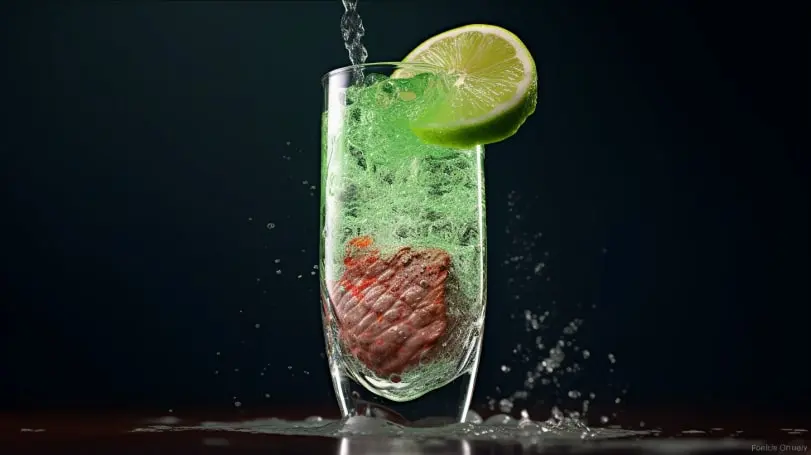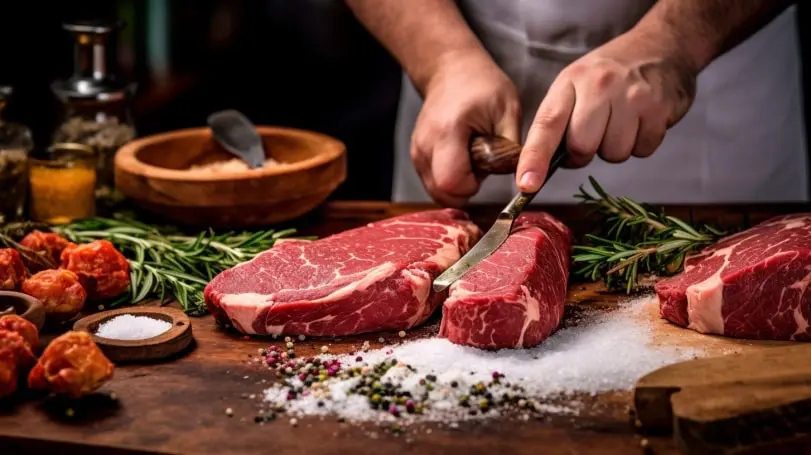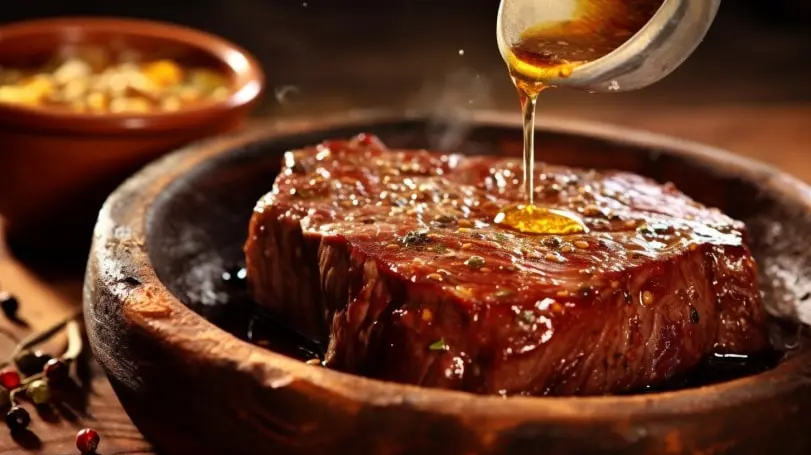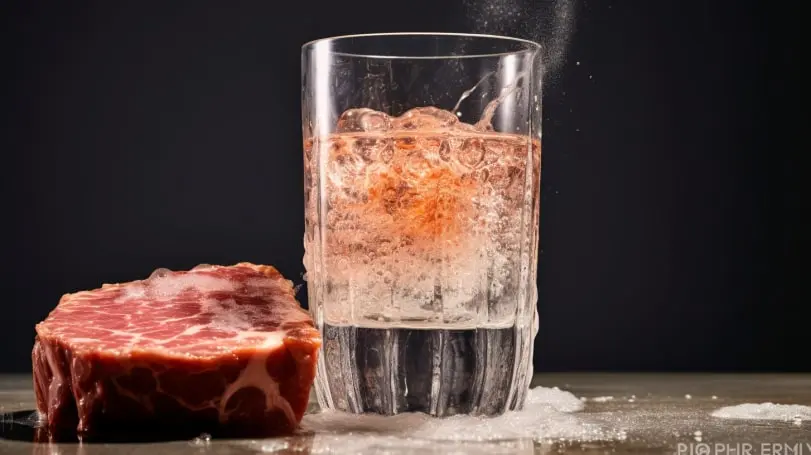Can Sprite Tenderize Meat?
In a world where food culture is constantly evolving, myths and misconceptions about various ingredients and cooking methods continue to prevail.
But can Sprite Tenderize Meat? This intriguing question has sparked numerous debates among food enthusiasts and curious cooks alike.
Surprisingly, the answer is a resounding No! You read that right.
Sprite, the beloved carbonated beverage, possesses the uncanny ability to tenderize meat, taking it to a whole new level of succulence and tenderness.
But how does this fizzy drink work its magic?
Stay tuned as we delve deeper into the science behind this unexpected culinary phenomenon and explore the surprising benefits of using Sprite as a tenderizer.
Get ready to discover a culinary secret that might just revolutionize your cooking game!
Key Takeaways
- Using Sprite as a meat tenderizer lacks scientific evidence and can result in unpredictable and inconsistent texture.
- Enzymatic or mechanical means are important factors in meat tenderization, with enzymes found in fruits like papaya and pineapple being more effective than soda.
- Slow cooking methods like braising or stewing can result in extremely tender meat, and marinating with traditional marinades containing acidic ingredients can also help break down tough muscle fibers.
- Carbonated beverages may not be an effective method for tenderizing all types of meat and may overpower the natural flavor of meat with high sugar content and artificial flavors. Alternative methods such as enzymatic meat tenderizers or traditional marinades are more effective at achieving optimal taste and texture in meat.
The Myth of Using Soda as a Meat Tenderizer
Contrary to popular belief, using soda as a meat tenderizer is a myth that lacks scientific evidence to support its effectiveness.
While some people believe that the acidity and carbonation of soda can break down the proteins in meat, there is no research to back up this claim.
In fact, many food experts argue that using soda on meat can actually have negative effects on texture and flavor.
Soda’s effects on meat texture are unpredictable and inconsistent. Some cuts of meat may become mushy or stringy when soaked in soda for too long, while others may not be affected at all.
Additionally, the high sugar content in soda can caramelize when cooked at high temperatures, resulting in a burnt or bitter taste.
Debunking popular kitchen myths like using soda as a meat tenderizer is important for home cooks who want to achieve optimal results with their cooking techniques.
It’s best to stick with tried-and-true methods of marinating or slow-cooking tough cuts of meat rather than relying on unproven tactics like soaking them in soda.
Can Sprite Tenderize Meat?
The answer is no, Sprite cannot tenderize meat. Sprite is a carbonated soft drink that primarily consists of water, high fructose corn syrup, and various artificial flavors.
While it may be a popular beverage to consume, it does not contain any enzymes or acids that are typically found in meat tenderizers.

Meat tenderizing usually involves breaking down the muscle fibers using enzymes or acids to make the meat more tender.
While Sprite does contain citric acid, it is not concentrated enough to effectively tenderize meat.
If you are looking to tenderize meat, it is recommended to use specific meat tenderizing methods such as marinating in acidic substances like vinegar, lemon juice, or certain fruits, or using a meat tenderizer tool to physically break down the muscle fibers.
These methods have been proven to be more effective in tenderizing meat compared to using Sprite or other carbonated beverages.
Therefore, it is best to use traditional meat tenderizers or other natural ingredients with tenderizing properties when trying to tenderize meat, rather than relying on carbonated beverages like Sprite.
Understanding the Science Behind Meat Tenderization
One of the most important factors in meat tenderization is the breakdown of connective tissue through enzymatic or mechanical means.
Meat enzymes play a crucial role in the process of tenderizing meat by breaking down collagen, which is responsible for making meat tough.
The enzymes that are naturally present in meat can be activated through various marinating techniques such as adding acidic ingredients like vinegar, citrus juice or wine, or by using enzymatic marinades that contain papaya, kiwi, pineapple or ginger.
These enzymes work by breaking down the protein structure and reducing the toughness of meat.
Mechanical methods such as pounding, grinding or slicing against the grain can also help break down connective tissue and make it easier to chew.

However, it should be noted that over-tenderizing meat can lead to a mushy texture and loss of flavor.
Therefore, finding the right balance between enzymatic and mechanical methods is key to achieving perfectly tenderized meat without compromising its taste and texture.
While soda may not be an effective tenderizer due to its lack of enzymes and high sugar content, understanding the science behind meat tenderization can help us choose the best marinating techniques for our desired outcome.
Carbonation and Acidity in Soda: How They Affect Meat
The carbonation and acidity present in certain beverages have been shown to have an impact on the texture and flavor of some food products.
This is particularly relevant when it comes to meat tenderization, as soda has long been considered a popular option for marinating meat due to its bubbly nature and acidic properties.
However, while this technique may be effective in breaking down tough muscle fibers, there are also concerns about the potential health risks associated with consuming large amounts of sugar-laden soda.
To better understand the effects of carbonation and acidity on meat, it can be helpful to examine the chemical processes that occur during marination.
As shown in the table below, acids such as vinegar or lemon juice can help break down proteins in meat by denaturing them, essentially unraveling their molecular structure.

Carbonation can also play a role by creating bubbles that work their way into the meat fibers, causing them to expand and soften over time.
While these techniques can certainly enhance the tenderness and flavor of meat dishes, there are also alternative methods available for those who wish to avoid using sugary sodas.
For example, marinades made from natural juices or plant-based enzymes like papaya or pineapple can also effectively tenderize meats without any added sugars or artificial ingredients.
| Acidic Ingredient | Effect on Meat | |||
|---|---|---|---|---|
| Vinegar | Helps denature proteins | |||
| Lemon Juice | Can soften muscle fibers | |||
| Yogurt | Contains enzymes that help break down protein | |||
| Pineapple Juice | Contains bromelain enzyme which helps tenderize meat | Papaya | Contains papain enzyme which helps break down tough muscle fibers in meat |
Comparing Sprite to Other Meat Tenderizing Methods
Examining the effectiveness of various meat tenderizing methods can provide insight into alternative options to using sugary sodas.
There are many tenderizing agents that can be used on different types of meats, such as enzymes from fruits like papaya and pineapple, or acidic marinades made from vinegar or citrus juices.
These agents work by breaking down the proteins in the muscle fibers, which makes them softer and easier to chew.
Slow cooking is another method that can be used to tenderize meat, as it allows for collagen in tough cuts of meat to break down over time.
When comparing Sprite to other meat tenderizing methods, it’s important to note that while carbonation and acidity can help break down proteins in some types of meats, it may not be as effective as other methods.
For example, research has shown that enzymes found in fruits like papaya and pineapple are more effective at breaking down proteins than soda.
Additionally, slow cooking methods like braising or stewing have been shown to result in extremely tender meat due to the breakdown of collagen over long periods of time.
While Sprite may work for certain cuts of meat, there are many alternative options available for those looking for a more effective way to tenderize their dishes without relying on sugary sodas.
Tips and Tricks for Tenderizing Meat

Enhancing the texture of meat can be achieved by implementing proper cooking techniques and choosing appropriate cuts that are naturally tender, such as filet mignon or ribeye.
However, for tougher cuts of meat, there are several tips and tricks that can help to tenderize them.
Firstly, it’s important to choose the right cut of meat. Cuts from areas that receive less exercise tend to be more tender, such as the loin or rib sections.
Additionally, marinating can help to break down tough connective tissue in the meat. Ingredients like vinegar or citrus juices work well for this purpose.
Finally, cooking techniques like slow-cooking or braising can also help to break down tough fibers in the meat.
While Sprite may have some tenderizing properties due to its acidic content and carbonation, there are alternative meat tenderizing methods that have been proven effective through scientific research.
Debunking Common Meat Tenderizing Myths
Misconceptions about meat tenderizing methods can lead to ineffective and potentially harmful practices, causing frustration for cooks trying to achieve the desired texture in their dishes.
One common myth is that carbonated beverages like Sprite can tenderize meat.
The theory behind this is that the acidity and carbonation of Sprite break down proteins in the meat, making it more tender. However, there is little scientific evidence to support this claim.
In reality, the best way to tenderize meat is by using a marinade or enzymatic tenderizer.
Marinades typically include acidic ingredients like vinegar or citrus juice along with herbs and spices. These ingredients work together to break down tough muscle fibers and add flavor to the meat.
Enzymatic tenderizers are also effective because they contain natural enzymes that break down proteins in the meat without affecting its flavor or texture.
While carbonated beverages may add some subtle flavor notes to your dish, they are not a reliable method for achieving perfectly tender meat.
It’s important for cooks to do their research before trying any new techniques so they can avoid wasting time and money on ineffective methods.
Is Sprite a Viable Meat Tenderizing Option?
It is clear that relying on carbonated beverages as a magical solution for achieving tender meat is a recipe for disappointment.
While there are some anecdotal reports of success with using Sprite or other similar drinks as a marinade or ingredient in a meat tenderizer, the scientific evidence does not support this practice.
Alternative methods, such as enzymatic meat tenderizers or traditional marinades containing acidic ingredients like vinegar or lemon juice, have been shown to be more effective at breaking down tough muscle fibers and improving the texture of meat.
Furthermore, it is important to consider the potential impact on taste when using carbonated beverages as a meat tenderizer.
The high sugar content and artificial flavors in many sodas may overpower the natural flavor of the meat, resulting in an unappetizing end product.
Taste comparisons between meats marinated with Sprite versus traditional marinades have shown inconsistent results, further highlighting the lack of reliable evidence supporting the use of carbonated beverages for meat tenderizing purposes.
Ultimately, while it may seem like an easy and convenient solution, relying on Sprite or other sodas to tenderize your meat is not recommended for achieving optimal taste and texture.
Frequently Asked Questions
What is the nutritional value of Sprite when used as a meat tenderizer?
There is no significant nutritional value to using Sprite as a meat tenderizer. However, it may impact the flavor of the dish. The health implications of using soda as a tenderizer are unclear and require further research.
Can other soft drinks be used to tenderize meat?
Soft drink alternatives can be used to tenderize meat, but the flavor impact must be considered. Different soft drinks may have varying levels of acidity and sweetness, which could affect the taste of the meat. Further research is needed to determine optimal soft drink choices for meat tenderizing.
How long should meat be soaked in Sprite to achieve optimal tenderness?
The optimal soaking time for meat in Sprite to achieve tenderness is not scientifically established. However, other soft drinks like cola have been found to possess similar properties. An analytical approach suggests exploring alternative tenderizing methods to Sprite.
Does the type of meat make a difference in the effectiveness of Sprite as a tenderizer?
The type of meat is a significant Meat type factor that affects the Sprite effectiveness as a marinade. Cooking techniques play an essential role in the tenderizing process, and some cuts of meat may require multiple applications or longer soaking times to achieve optimal tenderness.
Are there any risks or potential side effects associated with using Sprite as a meat tenderizer?
Potential risks and side effects associated with using sprite as a meat tenderizer have not been extensively studied. However, an effectiveness comparison of different tenderizing methods may reveal safer and more reliable options for achieving desired results without negative consequences.
Conclusion
The use of Sprite as a meat tenderizer remains a subject of debate. While carbonation and acidity in soda can affect the texture of meat, there is insufficient scientific evidence to support the effectiveness of using Sprite as a standalone tenderizing agent.
Moreover, other traditional methods such as marinades and slow-cooking have proven to be more reliable in tenderizing meats.
The pursuit for perfectly cooked and succulent meats often leads us down unexpected paths. However, it is crucial to approach these misconceptions with an objective lens while keeping in mind the science behind meat tenderization.
As we continue to explore new techniques and flavors in cooking, let’s not forget the tried-and-true methods that have stood the test of time.
After all, a meal shared with loved ones is about creating memories that will last long after our taste buds have faded away.
